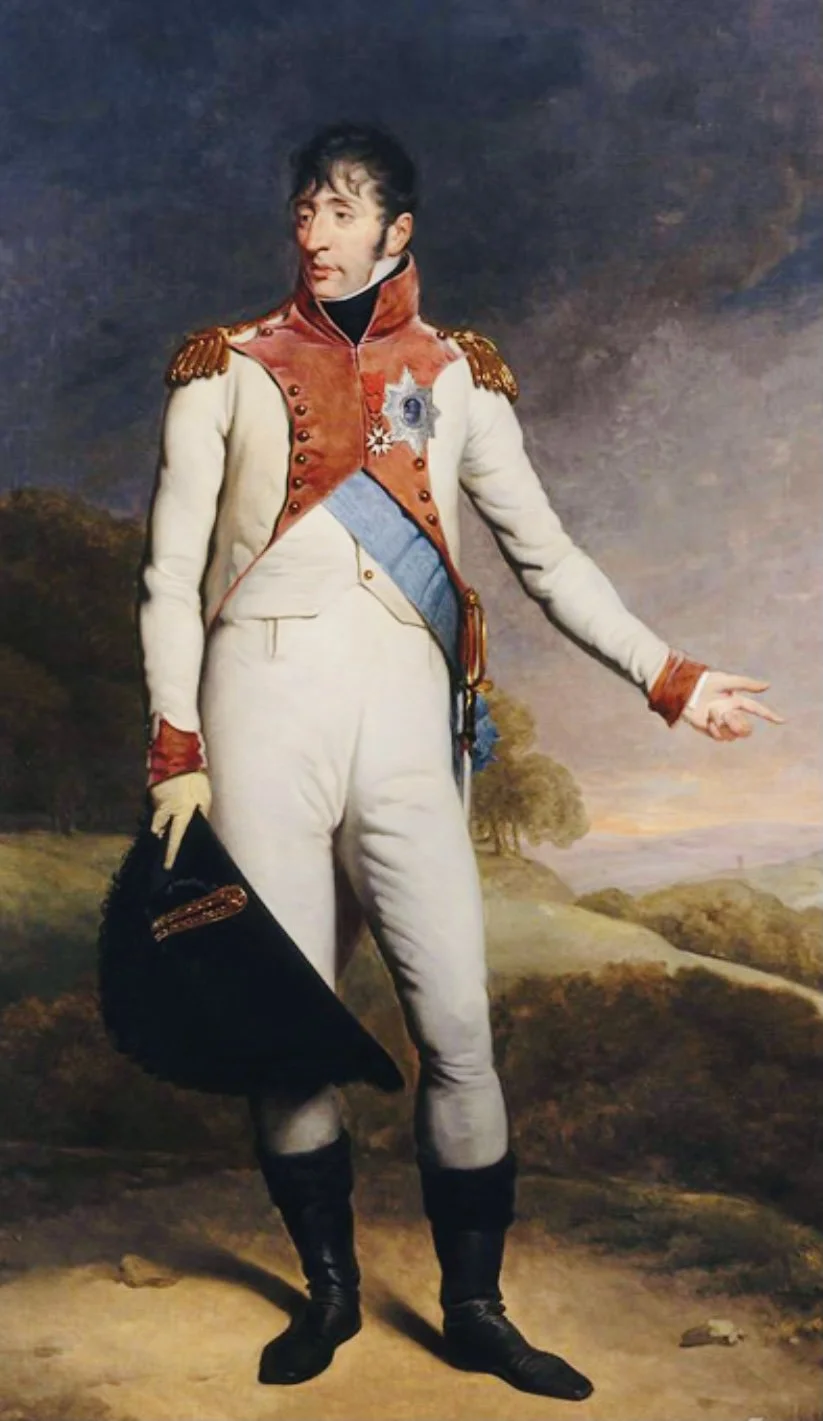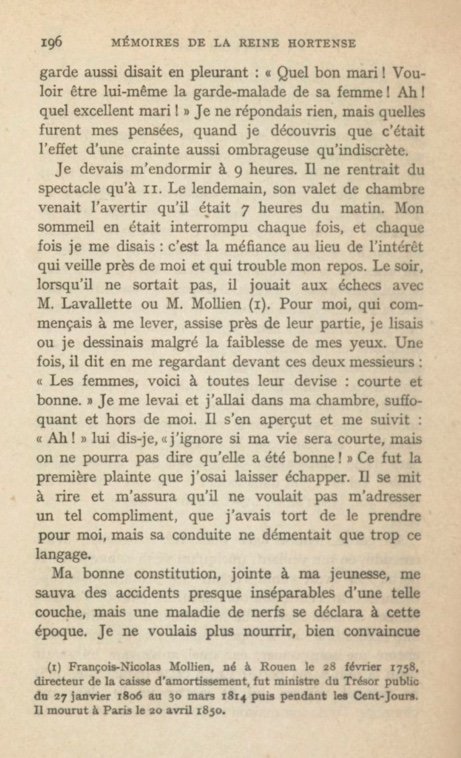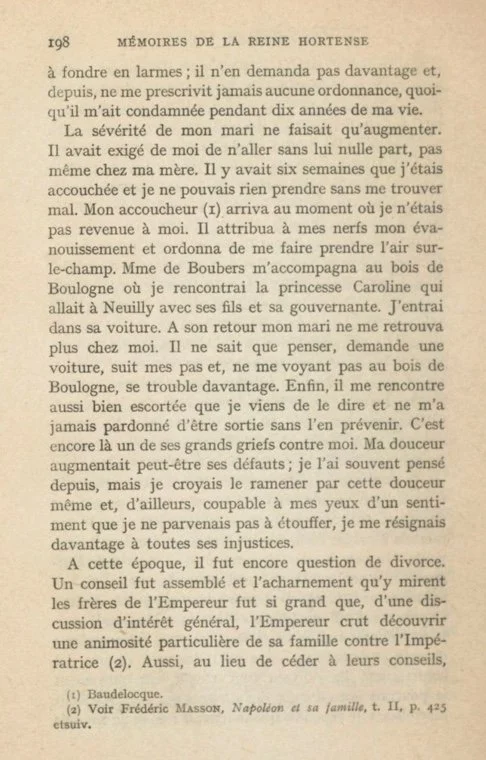Let’s have another look at Hortense’s Memoirs. If you want to read the book it is available for free at the side bar in English and French. Use the widget on the sidebar to translate the text below into pretty much any language.
In this excerpt, Hortense loses her health because yielding to an abuser only makes them even more abusive. Likely infiltrator, Charles de Flahaut also works on an obvious love triangle agenda between Napoleon’s sister Caroline and Napoleon’s stepdaughter and sister in law Hortense. Caroline and Hortense were well known to have a lot of friction between them.
Hortense’s memoirs continues:
I would have confided my problem to him, I had made up my mind to do so. Louis loved me, or at any rate he declared he did. He would understand my grief, he would help me overcome the tenderness which I felt toward Monsieur de Flahaut and aid me to escape the peril to which I was exposed. I was absorbed in these thoughts when, suddenly, a man entered my room. I uttered a cry; I felt as though I were about to faint. It was my husband.
"Oh, how you have frightened me!" was all I could say. I do not understand how it happened that the sight of a man appearing suddenly at night when I was alone in my apartment did not seriously affect my health, and hasten the birth of my child. I had no reason to expect to see him, for he was to have stayed some time longer in Turin. As a matter of fact, the day of his departure he had invited all the authorities to dine with him. In spite of this, for no known reason, he left the city, asking his aide-de-camp to act as host in his stead. He traveled day and night, left his carriage at the corner of the boulevard, dismissed his escort and entered his own home stealthily on foot.
Everyone was asleep. I was the only person awake. A maid was in the room next to mine. He would not let her warn me of his arrival. Without the slightest regard for my state of health, the fact that a sudden fright might result in a miscarriage, he exposed me to all these possible dangers for the sake of taking me by surprise. The excessive suspicion which this conduct betrayed stifled the confidence of a heart that, an instant before, had been longing for an understanding soul to which it might confide its troubles. I was unable to hide altogether the unpleasant impression such a home-coming made on me. Yet I had longed for my husband's return. I had counted on it to protect me from the dangers that threatened me.
Louis was surprised to find that I had not yet gone to bed. I told him of my visit to Neuilly, of the sadness which had come over me, of my desire to go to the country, and begged him to take me there immediately.
Louis Bonaparte.
How easy it would have been for him to have discovered my secret! Before his departure Louis had bought the two chateaux of Saint-Leu that had belonged to the Duc d’Orleans, who had disposed of it at the time of the Revolution.
The other and older one had belonged to a former juge des fêtes forains de Joinville. The manor-house on this second estate had been torn down, and the parks of the two domains thrown into one. The deep streams that flowed through these estates made them one of the loveliest spots in France. It was there we went to spend the last weeks before the date on which my child was to be born.
The beauties of nature have always produced an extraordinary effect on me. I did not recover my lost happiness at Saint-Leu, but at least the surroundings quieted my nerves.
Pleased with myself for having had the strength of mind to leave Paris, I enjoyed to the utmost this smiling countryside and the enchanting scenery. All nature reminded me that I still loved, but it likewise convinced me that it was possible to conquer this fatal inclination, for I had been able to escape from its toils at a moment when I felt them closing in on me.
When I was on the point of leaving for Saint-Leu, I received a letter from Monsieur de Flahaut. In order to write me he signed his mother's name.
He, appeared deeply grieved at my departure. He awaited a line from me and in return was prepared to offer to place his life at my feet. I made no reply and stepped into my carriage. Caroline came to see me.
Her sole topic of conversation was the joy of loving and being loved. Her affection for her husband, which once had been so violent, seemed to have diminished. She now was attracted by the charms of a pure liaison. Thus, it was easy to guess what was going on in her mind. Can a hurt vanity transform itself into love? Is such a metamorphosis possible? The moment I recognized in her a fellow victim, I sympathized with her.
“Perhaps," I said to myself, "she does not feel herself guilty to be in love. In that case she can be happier than I. I must not regret having overcome a passion which would make both me and another wretched."
My mother came back with the Emperor from Belgium. We returned to Paris and occupied a new mansion in the rue Cerutti for, since my husband's appointment as constable of France, we could no longer live in our little house in the rue de la Victoire.
During our stay at Saint-Leu Louis had rearranged my apartment. The height of the walls between our house and those of the neighbor's had been increased; a sentry-box had been placed in the garden close to my window. My maid could no longer enter my apartment except through the drawing-room. This latter innovation aroused so much mirth among our servants that my husband was obliged to have the door replaced that connected my room with the servants' quarters.
I made no comment whatever on these changes. His wishes were my wishes. Indeed, I felt that now the more he shut me in behind locks and bars, the greater service he was doing me. Of course, it never occurred to me to forget my duties as a wife to the extent of receiving a man in my private apartment, but the more obstacles I saw about me the better I was pleased.
My attendants, who were appointed by the Emperor, consisted of Madame de Viry, the lady in waiting, Madame de Villeneuve, Madame de Lery, Madame de Seyssel, Madame Mollien. I kept a post for Adele Auguié. Madame de Boubers was governess for my children, Madame de Boucheporn and Madame de Mornay were undergovernesses.
I had Monsieur Turgot as equerry and Abbe Bertrand as chaplain; the latter had formerly been our teacher at Saint-Germain. Monsieur d'Osmond, Bishop of Nancy, was our almoner and the principal officers attached to my husband were General Nogues, Monsieur de Caulaincourt, Monsieur de Broc, Monsieur d'Arjuzon, Monsieur de Villeneuve. He appointed a certain Monsieur de Senegra his steward.
The latter was supposed to enjoy his confidence, probably because he humored my husband's whims. De Senegra's duties included keeping a strict watch over everything that took place in the house, and in no country in Europe was the detective service as well organized as in my home.
This man was afraid of me. It must have been because he was frequently told to spy on my behavior. The result was he did not dare look at me although I treated him exactly as I did everybody else. The other aides-de-camp had nothing remarkable about them except their physical un-attractiveness.
My stay at Saint-Leu gave me the opportunity of becoming acquainted with all these gentlemen, none of whom ever set foot in my apartments. I was served entirely by my ladies in waiting.
Hortense Bonaparte.
My equerry appeared only on ceremonial occasions. On October 11, 1804, a few days after my arrival in Paris, I gave birth to a second son.
In accordance with the established custom, the High Chancellor Cambaceres and all the other officials remained in the drawing-room next to my bedchamber.
My mother had hastened up from Saint Cloud at the first symptoms and did not leave me for an instant. My husband, I must confess, also took care of me with the greatest solicitude. Under such circumstances as these his character seemed to undergo a change, but once the danger was over, he once again became morose and suspicious.
Public rejoicings and profuse gifts to hospitals marked the birth of a second heir to the throne, for, both the Emperor and his brother Joseph being childless, my sons were destined to succeed them.
When my child was to be christened his father wrote in the baptismal register "Louis," which was the name he wished his son to bear. The Emperor with his own hand struck this out, insisting that all the children in his family must be called "Napoleon" and that this name should come first."
My husband, who had been obliged to submit, kept telling me over and over again while I was ill with milk-fever about this usurpation of authority and the unreasonable demands of his brother who wished everything to be subordinated to his will.
Previously, when my first child was christened, my husband had wished to name him Charles instead of Napoleon.
These minor vexations made him colder in his attitude toward me. As I did not share his annoyance over what seemed to me to be matters of little importance he was inclined to hold me responsible for them, and this feeling made him the bitterer towards me.
If peace of mind is at all times a precious possession it becomes doubly so in the case of a poor woman lying groaning on a bed of pain, hardly recovered from the agonies which nature has inflicted on her.
On such occasions a woman longs for quiet, rest and the sympathetic care of all those who are about her. It seems as if Providence has designed these grievous trials for her in order that she may the better appreciate the joys of tender and loving care. Her weakness is so great, her sensitiveness so acute that she is unable to call upon her reason to dispel unpleasant impressions.
She becomes a child again, weeping at the slightest reproach, welcoming the most fugitive sign of kindness, but unable to bear any kind of moral shock. If at such times a misfortune falls upon her, it crushes her to earth and leaves marks which time cannot efface.
This was my condition at the moment of which I am now writing. My physical health, which had up to then withstood the moral strain, began to give way. My nurse, an old woman who nevertheless was extremely attentive to my needs, had frequently while she was sitting at night by my bedside heard someone come and listen outside my door. She had attempted to discover who it was but had not succeeded.
In telling of this incident, she thought she was merely accusing my servants of indiscreet curiosity. What she really did was to inform me that Louis dared still to be suspicious of me. For who else would have come by night to my door? This uneasiness he could not overcome finally caused him to have a bed put in my room.
All my attendants were deeply touched. My poor nurse also said with tears in her eyes "What a devoted husband he is! He wants to be his wife's nurse himself. Ah, how excellent a husband the Princess has!" I made no reply, but what were my feelings when I discovered that this action was due to a distrust that was as acute as it was indiscreet.
At nine o'clock I was supposed to go to sleep. Louis did not return from the theater till eleven. In the morning his valet woke him up at seven. My own sleep was disturbed each time and each time I said to myself, "It is suspicion, not sympathy, that inflicts this on me and watches at my bedside."
Evenings when he did not go out, my husband played chess with Monsieur Lavallette or Monsieur Mollien. I, who was just beginning to be able to get up, sat beside them, reading or drawing in spite of the weakness of my eyesight. One day, in the presence of the two other men, my husband looked at me and said, "Women all have the same motto—'Short and sweet.'
Overcome with indignation I rose and hurried to my room. Louis noticed my attitude and followed me. "Ah," I exclaimed, "I do not know whether my life will be short, but certainly no one could say that it has been sweet."
This was the first complaint that I had ever dared utter. My husband began to laugh. He assured me that such a compliment was not intended for me and that I was mistaken in applying it to myself.
On the other hand, all his actions betrayed the fact that this was his real opinion. My fine natural constitution plus my youth saved me from those ills that almost invariably accompany a confinement which takes place under such conditions, but nervous troubles appeared about this time.
I was no longer willing to nurse my child as I was sure that after these various emotions my milk would be unsatisfactory. It became necessary to relieve me of my milk, and this affected my head and my nerves.
Sometimes I would come out of a long contemplation, alarmed at the fact that my mind had been completely empty. These fits of absence proved all too clearly how weak I still was. At such times I would send for my little ones; I would look at them and convince myself that they still had need of their mother's care. I prayed that my courage might return and believed my prayer was answered. One day the wife of Marshal Lannes brought me her children. They were full of health and energy. I asked the doctor why mine were so pale. He replied: "These children are on a regular diet. Your son dines with his father, eats anything he wants to and consequently his health suffers."
My husband came in. I repeated gently to him what the doctor had said, but he replied in a rage, "You never want me to have a chance to see my boy." And he left the room, slamming the door so violently that my bed shook.
The nurse brought me my dinner. I tried to hide my emotion. I took a spoonful of soup, but could not swallow it and swooned away. I only mention this incident because it had serious effects on my general health.
For months I was unable to eat anything. The moment I sat down at meals the very sight of food made me faint. My only nourishment for a long while was a little dry bread with a little claret. The doctor could not understand my pulse at all. Doctor Corvisart said to me one day:
“You are seriously ill and I do not know in the least what is the matter. If you have any secret sorrow, confide it to me. Doctors are like father confessors; they must be told everything.
Otherwise, they are liable to prescribe remedies that will prove mortal poisons." I answered that nothing was the matter and as I spoke, I burst into tears. The doctor made no further inquiries and afterwards never made out another prescription although he disapproved my conduct for the ten years that followed.
My husband's severity toward me continued to increase. He had forbidden me to go anywhere, even to see my mother, without him. Six months had passed since my confinement and I was still unable to eat without fainting. Once my accoucheur came in before I had recovered my senses. He believed my nerves were responsible for my fainting fits and gave orders that I was to be taken out in the fresh air immediately.
Madame de Boubers accompanied me to the Bois de Boulogne where I met the Princess Caroline with her children and their governess.
I entered my carriage. On his return home, my husband had not found me in the house. He did not know what had taken place, took a carriage and followed my footsteps. Unable to find me in the Bois de Boulogne he became still more upset. Finally, he met me with the escort I have just described, but he never forgave me for having gone out without notifying him.
This is another of his most serious charges against me. Perhaps my gentleness increased his irritation. That idea has frequently occurred to me since, but at the time I believed that it was this very gentleness which would cure him. Moreover, as I felt myself guilty of an affection that I was unable to stifle, I was the, more ready to submit to his lack of equity.
The original French is available below:
Charles de Flahaut.















